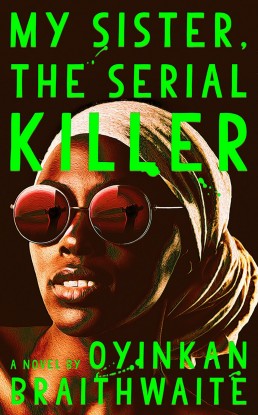Words by Delilah Kealy-Roberts
Photography by Kate Williams, via Unsplash
When it comes to sisters showing up for each other, a murderous compulsion can really put the relationship to the test. For sisters Korede and Ayoola however, a few stubborn blood stains aren’t going to come between them. Set in the sprawling metropolis of Lagos, Braithwaite’s novel My Sister the Serial Killer is a hilariously morbid tale of sisterly devotion even in the most macabre of circumstances.
After setting itself up as a ruthless slasher – opening with an emergency clean-up of a murder scene – this deliciously unusual story unfolds and gradually becomes more about the unconditional relationship between sisters than about the crimes committed. Ayoola and Korede are completely at odds: the former, a happy-go-lucky character, effortlessly beautiful and free from any moral responsibility. And the latter, from whom we hear the story, a hardworking, grounded, worrier who can’t help but share the weight of her sisters’ misadventures, ever readying herself for the consequences.
Korede stands by her younger sister through thick and thin. When Ayoola starts taking particular interest in Korede’s colleague and crush however, a potentially deadly love triangle begins to develop. To the readers’ delight, Braithwaite subverts the tired-out narrative of a romcom-esque situation by adding in an ever-present murder weapon and a woman on the edge. Satirising notions of Jealousy, Ayoola’s new boyfriend assumes that Korede is merely envious of her sister’s good looks and easy success with men. Little does he know, his vapid observations are getting him ever closer to Ayoola’s kill list and a resting place with the others at the bottom of the Ogun river.
When you delve a little further than the primary thrilling narrative in My Sister the Serial Killer, you will also find a more serious and perhaps even more sinister thread about patterns of abuse being passed down through the generations. The sisters’ father isn’t present in the story but is described posthumously as an overbearing figure of authority and a ruthless patriarch. Braithwaite steers clear from directly linking the violent tendencies, or in any way excusing Ayoola’s erratic actions because of her father’s abuse. Nevertheless, she is careful to highlight one symbolic link: Ayoola only ever uses her fathers’ knife to slay her victims.
Despite touching on serious matters, My Sister the Serial Killer is first and foremost a ridiculous and fun read. Within this story, sisterly bonds certainly know no limits. Even in the bleakest and most ludicrous of circumstances, the two hypnotising women are always there for each other, whichever side of the law that puts them on.
Some Bechdel Book Club Questions:
- Unconditional love or irrational allegiance: should Korede have just turned Ayoola in?
- Ayoola consistently maintains that “only the guilty go to prison” Why do you think that she so earnestly believes in her innocence?
- The sisters are presented as chalk and cheese, but as the story progresses do you still see more differences than similarities?
Delilah Kealy-Roberts
Delilah is a BA English literature graduate and writer based in the North East of England. She specialises in anything dystopian, with a particular interest in gender politics (spoiler alert: gender roles don’t exist in the apocalypse). She has an affinity towards finding cheap flights out of the UK and colossal veggie breakfasts.








